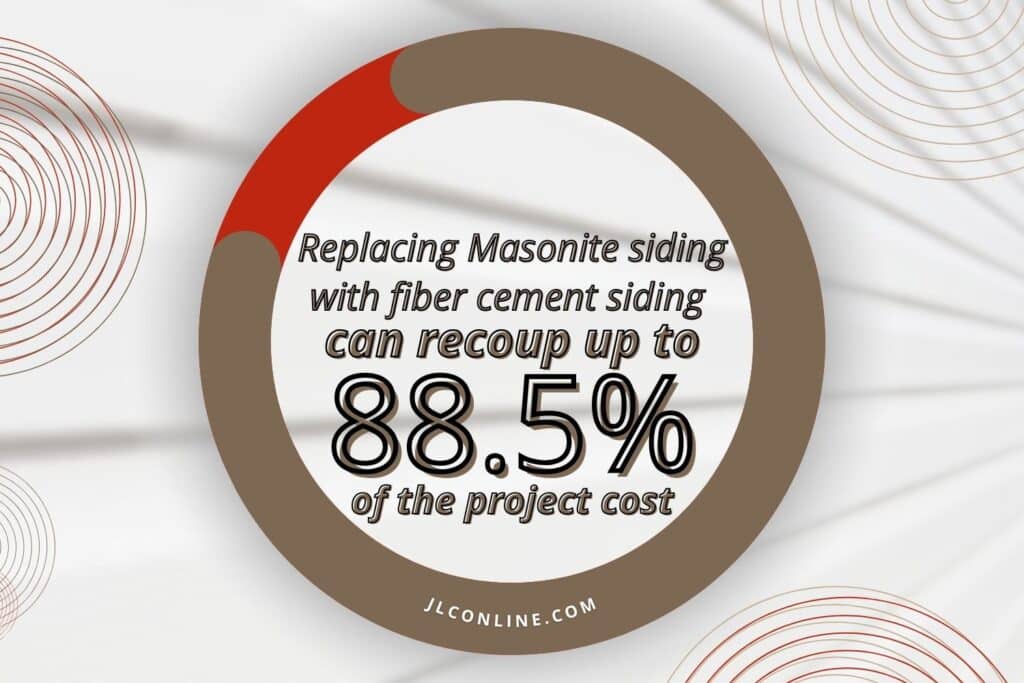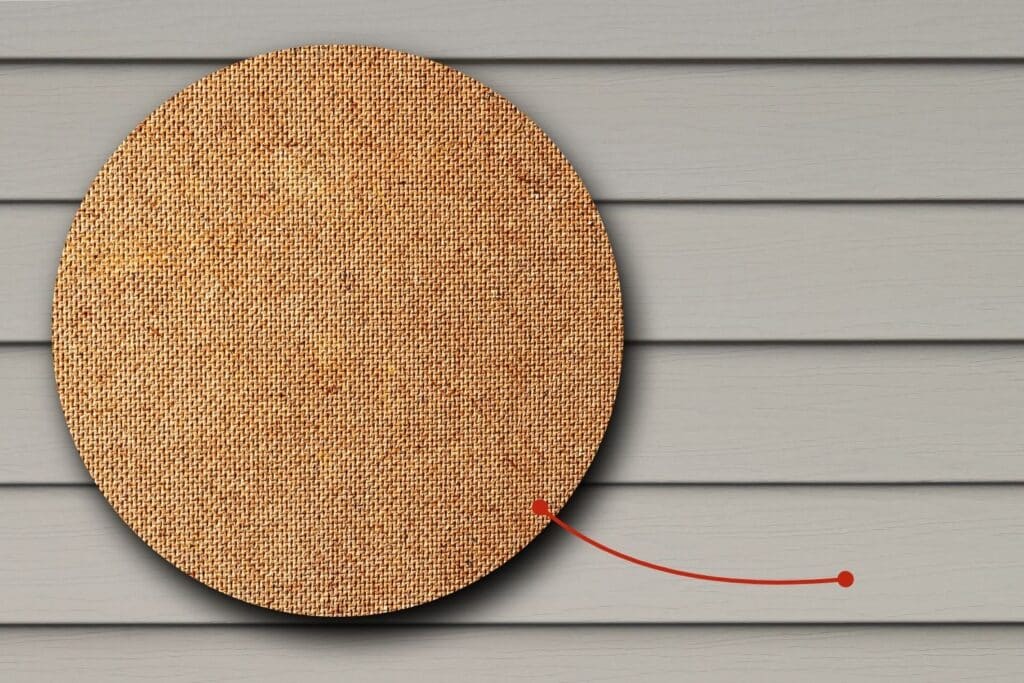If you’re buying, selling, or maintaining a home in Georgia, there’s a good chance you’ll come across the term Masonite (during an inspection, home project, etc). But what is Masonite, where is it used, and how can it affect your home’s value?
This guide breaks down everything you need to know, from what it’s made of to where it’s commonly found and what it means for homeowners and real estate decisions.
What Is Masonite Made Of?
Masonite is a brand of engineered wood known as hardboard. Originally developed in the 1920s by William H. Mason, Masonite quickly became popular for its affordability, versatility, and clean appearance.
Today, while the Masonite brand still exists, the term is widely used to describe similar fiberboard or hardboard products used across the building industry.
Masonite is a type of engineered wood, often referred to as hardboard. It’s made by breaking down wood chips into fibers using steam and pressure. These fibers are then compressed into dense, smooth boards without any added formaldehyde or synthetic adhesives. Instead, the wood’s natural lignin acts as a binder, creating a strong and uniform panel.
Where You’ll Commonly Find It
The material has been used in a wide range of residential and commercial applications. It was especially popular during the 1980s and 1990s, when it was frequently installed as exterior siding.
While it’s no longer commonly used for exterior applications, many homes still include Masonite components in interior construction or design.
Common places it may appear include:
- Exterior siding on older homes, especially in lap or panel styles
- Interior doors, particularly hollow-core designs
- Cabinet backs and furniture paneling
- Garage or workshop pegboards
- Art boards, easels, or craft surfaces
If you’re living in or purchasing a home built before the early 2000s, there’s a strong chance some part of the property includes Masonite or a similar fiberboard product.
Pros and Cons of it in a Home
Masonite offers several benefits, particularly for interior use, but it also presents challenges, especially when used as exterior siding in humid climates.
| Pros | Cons |
|---|---|
| Smooth surface that holds paint well | Can swell, warp, or rot if exposed to moisture |
| Uniform texture and density | Requires regular maintenance and sealing |
| Affordable and widely available | May deteriorate faster than modern siding materials |
| No added formaldehyde | Has been subject to siding failure lawsuits |
These concerns have real implications for resale value. According to Remodeling Magazine’s Cost vs. Value Report, replacing Masonite siding with fiber cement siding can recoup up to 88.5% of the project cost, adding an average of $17,129 to resale value.
In some markets, vinyl siding replacement offers up to a 94.7% return on investment.
How Masonite Affects Home Value
The presence of Masonite does not automatically decrease a home’s value. In fact, when used correctly and well-maintained, Masonite can be a durable and cost-effective material.
However, when exterior Masonite siding is left unprotected, it may deteriorate and lead to more serious structural or cosmetic concerns.
Here’s how Masonite can influence property value:
- Negative impact if siding is visibly damaged, swollen, or deteriorating
- Neutral to slightly positive when found indoors, such as in doors or furniture panels, especially if the surfaces are clean and well-maintained
- Potential negotiation issue if a buyer’s inspection reveals moisture damage or evidence of prior repairs
Many homes with original Masonite siding are now reaching the point where replacement or restoration is necessary. Sellers may see stronger offers if they proactively update or repair Masonite components before listing. Buyers, on the other hand, should budget for potential siding upgrades if damage is found.
Replacing & Upgrading Masonite
If Masonite in your home is showing signs of failure (especially on the exterior) it may be time to consider replacement. Fortunately, several modern materials offer longer life spans and better moisture resistance.
Popular replacement options include:
- Fiber cement siding, which offers excellent durability and resists mold, rot, and fire
- Engineered wood siding, designed to handle moisture more effectively than traditional hardboard
- Vinyl siding, a lower-maintenance and cost-effective choice
Inside the home, medium-density fiberboard (MDF) is often used in place of Masonite for cabinetry and doors. MDF has a smoother finish and more consistent composition, though it is also sensitive to moisture and should be sealed in damp environments like kitchens and bathrooms.
Replacing aging siding or upgrading interior components can improve curb appeal, reduce long-term maintenance, and reassure potential buyers during an inspection.

What’s Of Note to Buyers and Sellers?
Homeowners and sellers…
- Inspect exterior siding for cracks, peeling paint, swelling, or areas that feel soft to the touch
- Seal or repaint surfaces regularly to protect them from rain and humidity
- Consider partial or full replacement before selling if there is visible damage
Buyers…
- Ask your inspector to check all areas where Masonite might appear, especially along the lower portions of exterior siding or around windows and doors
- Look for signs of water intrusion, including stains, warping, or fungal growth
- Request a detailed inspection report if issues are found, including recommendations for repair or replacement
Common Questions
Is Masonite the same as hardboard?
Yes. Masonite is a brand name for hardboard. The terms are often used interchangeably in construction and home improvement.
Can Masonite be painted?
Absolutely. It holds paint well, but priming and sealing the surface is key to preventing moisture absorption and extending the lifespan.
Is Masonite waterproof?
No. Masonite is moisture-resistant only when properly sealed. Left exposed, it will absorb water and begin to deteriorate.
How long does Masonite siding last?
With good maintenance, it can last 20 to 30 years. In many cases, however, moisture exposure shortens its lifespan, especially in warm, humid climates.
Is Masonite safe?
Yes. Masonite does not contain added formaldehyde or toxic adhesives. It is considered safe for indoor use.
Conclusion
Knowing where Masonite appears in your home (and whether it’s performing as intended) is an important step in the buying or selling process. While not inherently a problem, when it’s neglected or damaged, it can lead to bigger issues.
Champia Real Estate Inspections has over 30 years of experience helping homeowners assess materials and identify risks before they become costly. If you’re preparing to buy or sell a home around Atlanta or Ann Arbor, schedule an inspection today to get clear answers and peace of mind.
